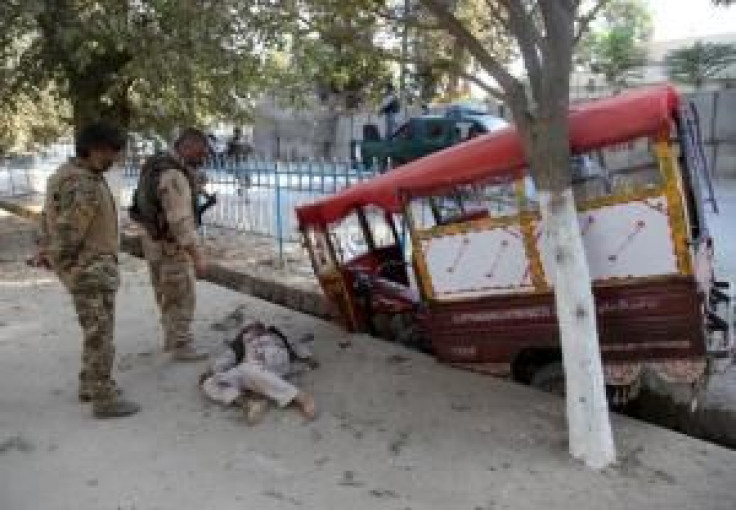Afghans Trapped By Fighting In City 'No Longer Fit For Living'

KUNDUZ, Afghanistan (Reuters) -- Decomposing bodies littered the streets of Kunduz and food was running scarce on Sunday, six days after Afghan government forces backed up by U.S. air power launched an offensive to retake the northern Afghan city from Taliban fighters.
"This city is no longer fit for living," said Sayed Mukhtar, the province's public health director.
The city of 300,000 has been without electricity since its capture by the Taliban fighters. Most of the residents who have not already fled remain confined to their homes as the fighting continues to rage.
Kunduz is short on medical care after one of its main hospitals was hit by a suspected U.S. air strike on Saturday in an incident that prompted international condemnation.
Reuters TV footage showed dead bodies lying amid debris and rubble in Kunduz, normally a sleepy provincial capital. Residents were left to bury some of the corpses that lay in front of their houses.
"A few minutes ago, a resident of Kunduz phoned me and said he had buried a member of his family inside the yard of his house," said Fatima Aziz, a member of parliament.
"They were saying they will die of hunger."
Despite reports of food shortages, some residents were too frightened to leave their homes.
"There is no hope for a normal life in Kunduz in the next few days as the security is really bad," said local resident Gulboddin, who only has one name.
"Some people are leaving their houses to get bread or find something to eat and they get attacked," Gulboddin said.
Life in Kunduz has grown increasingly difficult in recent months due to the Taliban advances on the city, their last stronghold to fall after U.S.-led forces drove the Islamist militants from power in Kabul in 2001.
Anyone unlucky enough to get caught in the crossfire on Sunday would be short on options following an aerial attack the day before that hit one of the city's main hospitals.
Medical aid group Medecins Sans Frontieres (MSF) said an air strike, probably carried out by U.S.-led coalition forces, had killed 22 staff and patients and wounded more than 30 on Saturday in the hospital it runs in Kunduz.
The U.S. military said it had conducted an air strike "in the vicinity" of the hospital, as it targeted Taliban insurgents who were directly firing on U.S. military personnel.
Other hospitals in Kunduz, run by the government, have run out of medical supplies and are able to provide only basic care to patients, Mukhtar said.
"We cannot provide services other than first aid to our patients," he said.
"There is no electricity, laboratories are not working."
However, a trickle of life was returning in some areas where the fighting had died down.
"In the past few days there was heavy fighting and we were hungry, but now the situation is a little better and police are distributing food for us," said Kunduz resident Mustafa Jan.
© Copyright Thomson Reuters 2024. All rights reserved.











